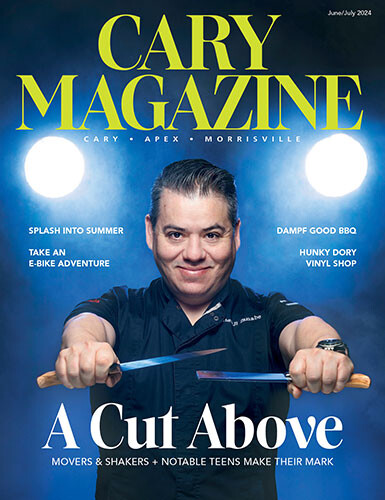If you live in Western Wake, chances are you’ve heard about Anna’s Angels, the nonprofit raising funds for Down syndrome research. But behind the scenes of the nonprofit is one woman’s million-dollar mission, and Cary Magazine has her story:
Michelle Pfeiffer downplays her own role in the success of the nonprofit she founded and directs, Anna’s Angels, as she thanks her community of supporters again and again — but it’s clear that her hard work makes things happen.
“Every day I’m working on Anna’s Angels,” Pfeiffer said. “I would say it’s part-time because my kiddos always come first, but I don’t put it away. Weekends I’ll do stuff, at night I’ll do stuff. So although I’m not in the office from 9 to 5, it’s constant.”
That hard work has paid off.
Anna’s Angels has raised more than $1 million for Down syndrome research and treatment at Duke Children’s Hospital. That support has funded infrastructure which includes a data registry and tissue repository (Biobank) at Duke. The nonprofit also provides a support network for parents, family members and friends of individuals with Down syndrome.
Pfeiffer recalls searching for a similar community and for vital information after her second child, Anna, was born in June 2001 with Down syndrome.
“So I was reading about Down syndrome,” she said, “and even though it was only 12 years ago there wasn’t a lot out there.”
There were fewer answers to her questions the following year when Anna was diagnosed with Acute Myeloid Leukemia (AML), a type of cancer more prevalent in people with Down syndrome. Pfeiffer, who had left a job as senior manager at MCI, knew then that she needed to do something to help.
With encouragement from Dr. Philip Rosoff, director of clinical ethics and former chief oncologist at Duke Children’s Hospital, Pfeiffer and her husband, Andrew Merrills, began Anna’s Angels in November 2003, with the modest goal of raising $5,000, enough to launch a single research study.
“When I started I can’t say I really knew that it was going to be successful, and who was going to come to events that we had,” Pfeiffer said. “I just felt like something had to be done.”
That first year, the group raised $15,000. Ten years later, at the group’s 2013 gala at Prestonwood Country Club, Anna’s Angels passed the $1 million mark.
“We definitely savored it,” Pfeiffer said, “but so much of it went back out as thank you, thank you, thank you to the community, because it never would have happened without this wonderful community.”
One of the gala’s highlights was “Glee” actress Lauren Potter’s appearance. Potter has Down syndrome.
Longtime donors and supporters make these fundraisers possible, but Pfeiffer also credits a lesson from the business world.
“I feel like we have to say what we’re doing and show that we’re making a difference,” she said. “We have to continue to produce, just like a profitable company. You have to keep your shareholders happy, and I think at a nonprofit, you have to show your funders what you’re doing.”
There should be plenty to show donors in the coming years. Pfeiffer is especially excited about a speech therapy study, led by Dr. Harrison Jones at Duke Children’s Hospital. And although it isn’t funded by her group, Pfeiffer is also encouraged by a Roche pharmaceutical study that could improve cognition in individuals with Down syndrome.
“The communication project that Dr. (Jones) is doing is really exciting to me, because if we can help their communication, it will really help them in the community, whether we bump their IQ up or not. … If you don’t have that communication, then you’re sort of discarded,” Pfeiffer said.
These projects fit with the long-term mission of Anna’s Angels: to improve the cognitive and communicative abilities of individuals with Down syndrome.
“If we can get them to communicate better, that would make me overjoyed,” Pfeiffer said.
Her ambitions for her daughter are simple, yet they are what all parents want for their children.
“I really see Anna as someone who will be out there working somewhere. She’ll be happy, she’ll have her own life,” Pfeiffer said. “When you think of special needs, you think of all the differences, but we’re really so much more alike.”






